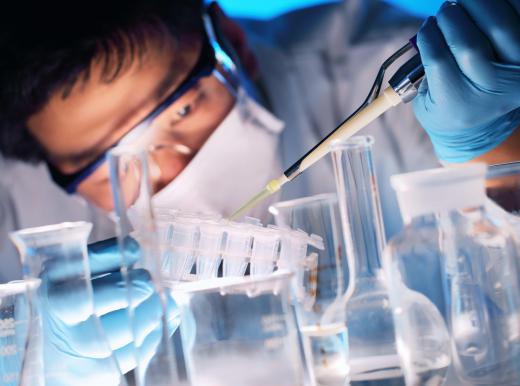What is a Solid State Reaction?
A solid state reaction, also called a dry media reaction or a solventless reaction, is a chemical reaction in which solvents are not used. In a normal reaction, the reacting agents, also called the reactants, are placed in a solvent before the reaction can take place. These reactants react to form a new substance. After the reaction is completed, scientists are able to remove the new product from the solvent. A solid-state reaction, however, allows the reactants to chemically react without the presence of a solvent.
The advantages of solid state reactions ripple throughout many industries. It is important to economics because the elimination of solvents means that products will cost less. This, in turn, will make those products cheaper to buy. With normal reactions, scientists need to remove the residual solvent from the resulting product after a reaction has finished. Producing materials from a solid state reaction will mean that scientists are able to bypass the purification process.

Eliminating the solvent from the reaction means that a solid state reaction produces more product than a normal reaction can. It also is more environmentally friendly. Since there is no solvent, there is no waste to eliminate at the end of the reaction.
An example of a solid state reaction revolutionizing other industries is the development of a recyclable catalyst. This catalyst is able to be completely removed and reused at the end of the reaction. The catalyst is first dissolved in the reactants. Once the reactants are introduced to one another, the catalyst slowly precipitates into a sticky solid. The reactants are able to fully react with each other, and the catalyst separates itself from the resulting products and is able to be separated and recycled.
There are several conditions under which this type of reaction can take place. Oven techniques use high temperatures to encourage reactions without solvents. In a melt technique, the reactants are melted together. The melted reactants interact in the liquid state and become a paste which then hardens into a solid. Some reactants are highly reactive in the presence of a gas. Therefore, scientists expose the substance to a stream of reactive gas. This process is called a gas reaction.
Although there are many benefits to developing solid state reactions, there are also many drawbacks. The ideal process should result in a homogeneous, or uniform, substance, and some solid state reactions do not. In addition, these reactions are, for obvious reasons, useless for reactions requiring solvents.
AS FEATURED ON:
AS FEATURED ON:











Discussion Comments
Can you go more in depth into what the reusable catalysts are or who did research into them?
What is a solid-state laser? Do these work through manipulating solid-state reactions? This type of stuff is way over my head scientifically, but I am interested in learning more. I was watching a show about the Lawrence Livermore National Laboratory in California. The show was about the laser that is housed there for their fusion energy research program. It is called LIFE and it is supposedly the largest laser in the world. From what I learned in the show, the laser is helping to develop renewable and cost-effective energy.
@istria- While solid state reactions are not actually used by your solid state flash drives, solid state reactions are used to make most capacitor material in those drives and other electronics. Solid-state reactions are also used in a large number of power storage technologies. Lithium-ion batteries use solid-state reactions to store and transfer energy. Large renewable energy systems may also use solid-state reactions for molten thermal storage (i.e., liquid sodium energy storage). These are just a few of the roles solid-state reactions play in our everyday lives. They are very important roles that actually allow us to be as technologically advanced as we are.
As for who would study solid-state reactions, it could be both chemists and physicists. I have a friend who is a chemist and is in graduate school for chemical engineering. He is working on research to develop solid-state batteries and capacitors for use in efficient energy storage. Solid-state reactions are actually at the cusp of chemistry and physics, so either type of scientists may study these reactions.
What other significant role do solid state reactions play in our lives? Are solid state reactions chemical or physical reactions? Would it be a chemist or physicist that would study solid state reactions? The only thing I know about solid state reactions is the solid state harddrive in my laptop, but I am not sure if it even has anything to do with a solid state reaction.
Post your comments